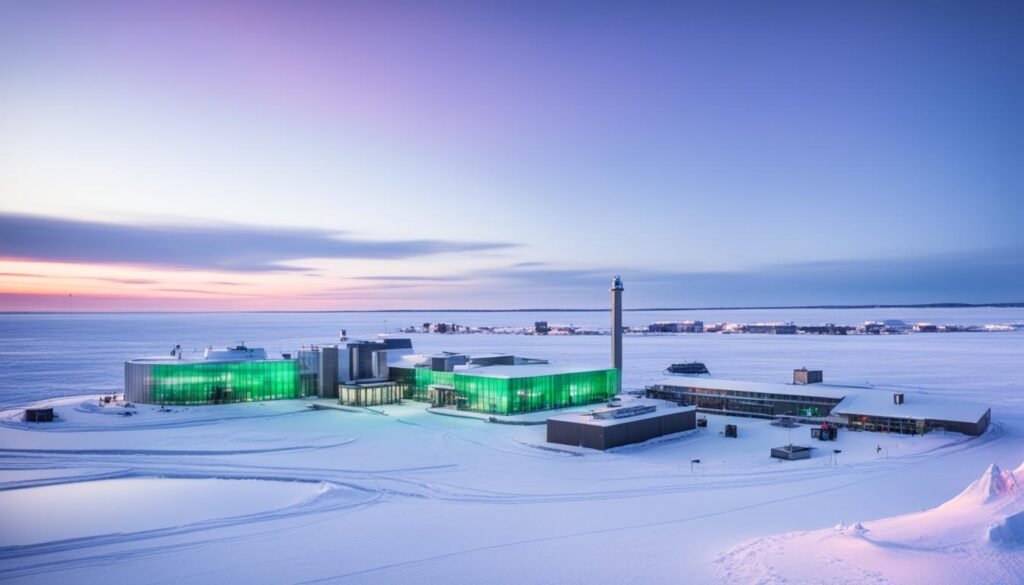Did you know that the Canadian Arctic accounts for over 40% of the country’s total landmass? This vast, remote region is the focus of a groundbreaking new research program that aims to empower northern and Indigenous communities in the face of rapidly changing environmental conditions. The Arctic Studies PhD: Nunavut, Canada Research Program is a collaborative initiative that brings together leading experts in polar sciences, environmental research, and Inuit cultural preservation.
Launched in 2022, this 6-year program is funded by the Canadian government’s National Research Council (NRC) and is designed to address the urgent challenges facing the Arctic and Northern regions. By fostering interdisciplinary research projects and strengthening partnerships with local communities, the program seeks to deepen our understanding of climate-driven changes and their impacts on Inuit livelihoods, health, and well-being.
Key Takeaways
- The Arctic Studies PhD: Nunavut, Canada Research Program is a collaborative initiative funded by the Canadian government’s National Research Council (NRC).
- The program aims to address urgent challenges facing the Arctic and Northern regions, with a focus on climate-driven changes and their impacts on Inuit communities.
- The research projects are designed to be interdisciplinary, drawing on expertise in polar sciences, environmental research, and Inuit cultural preservation.
- The program works closely with Northern and Indigenous collaborators to ensure the research remains relevant and responsive to the needs of Arctic and Northern communities.
- The program’s goal is to empower northern and Indigenous communities in the face of rapidly changing environmental conditions.
Introduction to the Arctic and Northern Challenge Program
The Arctic and Northern Challenge program, led by the National Research Council of Canada, is a collaborative initiative that aims to address the pressing challenges faced by Northern and Inuit communities. Spearheaded by Program Director Anne Barker, this groundbreaking program builds upon the NRC’s extensive experience in Arctic and Northern research.
Message from Anne Barker, Program Director
According to Anne Barker, the program’s priorities and projects are developed in close collaboration with Northern and Indigenous partners, including the program’s advisory committee members from across Northern Canada. “This program is designed to incorporate Inuit knowledge and values, advance research in innovative ways, and work collectively with our partners and communities to address their unique needs and priorities,” Barker emphasizes. The program’s focus on climate change impacts, collaborative research, and empowering Inuit communities is a testament to its commitment to sustainable and informed solutions for the Arctic region.

The Arctic and Northern Challenge program is poised to make a significant impact on the lives of Northern and Inuit communities, drawing on the National Research Council of Canada’s wealth of expertise and the invaluable contributions of its diverse collaborators. By embracing a collaborative approach and prioritizing local knowledge, this program aims to address the pressing challenges faced by the region, ultimately fostering a more resilient and sustainable future for the Arctic.
Program Advisory Committee
The Arctic and Northern Challenge program has an appointed advisory committee that provides strategic guidance on the program’s collaborative research projects. This committee includes representatives from organizations such as Inuit Tapiriit Kanatami and Dragonworks Inc. The advisory members are tasked with reviewing the program’s project portfolio, performance metrics, scientific progress, Northern capacity development, and incorporation of Indigenous knowledge.
Advisory Members
Martin Lougheed, the manager of the research and information department at Inuit Tapiriit Kanatami’s Inuit Qaujisarvingat, and Joe Dragon, the leader of the strategic consulting company Dragonworks Inc., have been selected as the committee co-chairs. Their expertise in collaborative research and Indigenous knowledge will be invaluable in shaping the direction of the Arctic and Northern Challenge program.

Martin Lougheed Bio
Martin Lougheed is the manager of the research and information department at Inuit Tapiriit Kanatami’s Inuit Qaujisarvingat. He has extensive experience in northern research and Inuit Tapiriit Kanatami, an organization that represents the Inuit of Canada. Lougheed’s expertise in collaborative research and Indigenous knowledge will be invaluable in guiding the Arctic and Northern Challenge program.
Joe Dragon Bio
Joe Dragon is the leader of the strategic consulting company Dragonworks Inc. He has a wealth of experience in northern research and collaborative research projects. Dragon’s expertise in Indigenous knowledge and his work with Inuit Tapiriit Kanatami make him an ideal co-chair for the Arctic and Northern Challenge program’s advisory committee.
Current Research Projects
Among the exciting initiatives underway in the Arctic and Northern Challenge program is the Sikuttiaq project. This innovative endeavor is led by the Inuit community, combining their deep inuit knowledge with cutting-edge technologies like remote sensing, drone technology, and satellite data to address the pressing challenges posed by climate change impacts on sea ice travel.
The Sikuttiaq project aims to empower Inuit communities by generating comprehensive, user-friendly maps that detail the evolving conditions of sea ice. As the climate continues to transform the Arctic landscape, the roughness, thickness, and slush of the sea ice have become increasingly hazardous for Inuit who rely on this vital transportation network. By harnessing the power of inuit-led research, the project team, which includes researchers from organizations such as the Arctic Eider Society, Bird’s Eye Inc., and the National Research Council of Canada, is working to create new data layers that will enhance the safety and resilience of Inuit sea ice travel.
Through this innovative approach, the Sikuttiaq project is poised to make a significant impact on the lives of Inuit communities, empowering them with the knowledge and tools they need to navigate the changing Arctic landscape with greater confidence and security.
REMIROCaN: Renewable Energy Microgrids for Remote Off-Grid Cabins
In the remote communities of Northern Canada, renewable energy solutions are playing a crucial role in reducing carbon emissions and enhancing energy resilience. The REMIROCaN project, which stands for “Renewable Energy Microgrids for Remote Off-Grid Cabins,” is a pioneering initiative that seeks to integrate renewable energy systems into remote, off-grid cabins in Inuit Nunangat.
Guided by the principles of Inuit Qaujimajatuqangit, or traditional Inuit knowledge, the REMIROCaN project aims to foster innovative and environmentally conscious approaches to energy generation. By harnessing the Inuit values of Qanuqtuurniq (being innovative and respectful towards the environment) and Avatittinnik kamatsiarniq (having respect for the environment), the project aims to reduce the dependence on fossil fuels and mitigate the impact of climate change in these remote communities.

The integration of renewable energy solutions, such as solar, wind, and energy storage systems, is expected to not only lower carbon emissions but also enhance the energy resilience of these remote cabins. By reducing the reliance on diesel generators and other fossil fuel-based energy sources, the project seeks to empower Inuit communities and improve their overall quality of life.
The REMIROCaN project is a testament to the power of collaboration and the integration of traditional Inuit knowledge with modern renewable energy technologies. By working closely with Inuit communities, the project aims to create sustainable and energy-efficient solutions that can serve as a blueprint for other remote regions facing similar challenges.
University of Toronto’s Arctic Research Contributions
The University of Toronto, a leading university in Canada, has a strong presence in arctic research, with approximately 25 researchers focused on diverse areas such as climate and environmental sciences, health and health technology, humanities and the arts, and architecture. Researchers at U of T have made significant contributions to arctic research, including connections to initiatives like the Canadian Sea Ice and Snow Evolution Network and the Canadian Network for the Detection of Atmospheric Change, which has established the Polar Environment Atmospheric Research Laboratory in Nunavut.
The University of Toronto’s commitment to arctic research is evident in its comprehensive approach, covering a wide range of disciplines. From climate science to health technology and indigenous knowledge in the arts and humanities, U of T researchers are at the forefront of understanding and addressing the unique challenges faced in the Arctic region.

Through collaborative efforts and innovative projects, the University of Toronto continues to contribute to the advancement of arctic research and the betterment of communities in the North. Its multidisciplinary approach and dedication to tackling complex issues make it a valuable partner in the ongoing efforts to understand and protect this fragile and vital ecosystem.
Canada: Arctic Studies PhD Program Nunavut Canada
The University of Toronto, a renowned research university in Canada, offers a comprehensive arctic studies PhD program in Nunavut, Canada. This program provides students with the opportunity to engage in interdisciplinary research on a wide range of topics, including climate change, indigenous cultures, and polar sciences. The program’s faculty and researchers collaborate with Northern and Indigenous partners to ensure the relevance and responsiveness of the research to the needs of Arctic communities.
The University of Toronto’s Arctic Studies PhD program in Nunavut, Canada, is a unique opportunity for students interested in environmental research and polar sciences. The program’s focus on indigenous culture and community engagement sets it apart, ensuring that the research conducted is meaningful and beneficial to the local population.
Through this PhD program, students can explore a variety of topics related to the Arctic region, including climate change, renewable energy, and the preservation of traditional Inuit knowledge. The program’s interdisciplinary approach allows students to collaborate with researchers from various fields, fostering a deeper understanding of the complex challenges facing the North.
By pursuing an arctic studies PhD at the University of Toronto’s Nunavut campus, students can contribute to the advancement of environmental research and the development of sustainable solutions for the Arctic region. This program offers a unique opportunity to combine academic excellence with real-world impact, making it an attractive option for those passionate about the polar sciences and the preservation of indigenous culture.
Canada-Inuit Nunangat-United Kingdom Arctic Research Programme
The Canada-Inuit Nunangat-United Kingdom Arctic Research Programme is a collaborative initiative that brings together Inuit Tapiriit Kanatami, UK Research and Innovation, Polar Knowledge Canada, National Research Council of Canada, Parks Canada, and the Fonds de Recherche du Quebec. This program supports research projects focused on climate-driven changes in the arctic region, particularly in the terrestrial, coastal, and near-shore marine environments of Inuit Nunangat, as well as the impacts on Inuit and community health and well-being.
High-Level Programme Details
The program aims to address key challenges related to the arctic environment and its indigenous communities. By funding innovative research projects, the partners seek to advance our understanding of the climate change-driven transformations occurring in the Arctic, and develop solutions to support the resilience and well-being of Inuit Nunangat.
Available Funding
The Canada-Inuit Nunangat-United Kingdom Arctic Research Programme has secured approximately CAD 6.9 million in funding from the Canadian partners, and £7.63 million from the UK. This significant investment demonstrates the commitment of all parties to advancing environmental science, indigenous health, and climate change research in the Arctic region.
Key Resources
Researchers interested in participating in the program can access detailed information about the program’s requirements, eligibility criteria, and application process on the dedicated program website. This comprehensive resource serves as a valuable gateway for those seeking to contribute to the arctic research programme, inuit nunangat, canada, and uk collaborative efforts addressing climate change, indigenous health, and environmental science.
Networking and Collaboration Opportunities
The Canada-Inuit Nunangat-United Kingdom Arctic Research Programme offers valuable networking and collaboration opportunities for researchers interested in contributing to arctic research. The program organizes informative webinars to promote the initiative, share crucial information, and assist participants in building valuable networks.
Moreover, the program has created a dedicated collaboration platform where potential applicants can connect with new partners and foster exchanges that could lead to fruitful research partnerships. The use of this platform is strongly encouraged, as it supports the program’s goal of promoting interdisciplinary and international collaboration in the field of Arctic research.
By leveraging these networking and collaboration opportunities, researchers can expand their reach, explore new perspectives, and contribute to the collective understanding of the Arctic region. The program’s emphasis on fostering interdisciplinary and international cooperation is a testament to the importance of collaborative efforts in advancing Arctic research and addressing the unique challenges faced in this dynamic environment.
Conclusion
The Arctic Studies PhD program in Nunavut, Canada, offered by the University of Toronto, stands as a beacon of interdisciplinary research and collaboration. By engaging with Northern and Indigenous partners, this initiative ensures that the research remains deeply rooted in the needs and perspectives of the local communities. The broader Canada-Inuit Nunangat-United Kingdom Arctic Research Programme further amplifies this commitment, providing vital funding for projects that address the pressing impacts of climate change and promote the well-being of Inuit and their communities.
Through these innovative programs, students and researchers are poised to make significant contributions to our understanding and stewardship of the Arctic region. By fostering international partnerships and leveraging diverse expertise, these efforts are shaping a future where the resilience and sustainability of the Arctic ecosystem are secured for generations to come.
As the Arctic Studies PhD program in Nunavut, Canada, and the wider Canada-Inuit Nunangat-United Kingdom Arctic Research Programme continue to evolve, they serve as a powerful model for collaborative, community-driven research that responds to the urgent challenges facing the North. By embracing this holistic approach, these initiatives are paving the way for a more sustainable and equitable future for the Arctic and its people.
Source Links
- Canada-Inuit Nunangat-United Kingdom Arctic Research Programme (CINUK) – https://frq.gouv.qc.ca/en/program/canada-inuit-nunangat-united-kingdom-arctic-research-programme/
- Canada – https://www.uarctic.org/members/member-profiles/canada/8901/university-of-toronto
- The Arctic Circular – National Research Council Canada – https://nrc.canada.ca/en/research-development/research-collaboration/programs/arctic-circular


